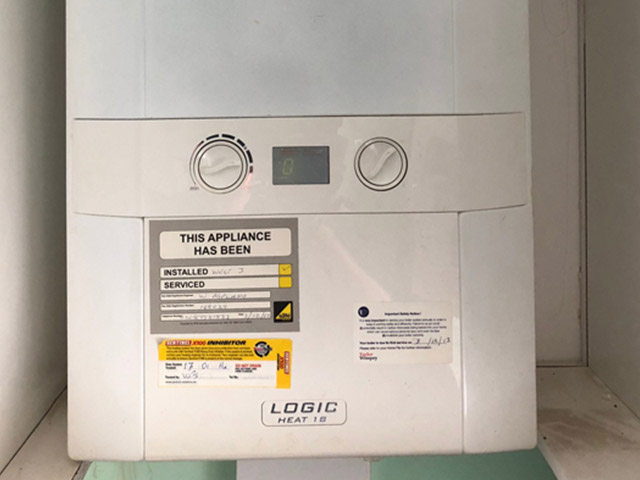
We work on central heating systems powered by any brand of boiler.
Our work is carried out on your heating system pipework along with your boiler.

All of our engineers are time served plumbing and heating engineers, equipped with the latest in leak detection technology and training.
Our goal is to find & repair your leak.

Our expert engineers utilize several forms of leak detection technology in order to pinpoint the location of your leak - without ripping up your floors!
Boiler pressure is like the life force of your heating system. It’s what makes the hot water flow through the pipes, warming up your home and keeping you cozy. But just like Goldilocks and her porridge, the pressure has to be just right. If it’s too high, your boiler might throw a tantrum and shut down. But if it’s too low, there could be a sneaky leak somewhere, causing you to lose water and pressure.
Now, don’t be alarmed if you notice the pressure dancing around a bit. When your central heating is in action, the pressure will naturally rise as the water heats up. But once everything cools down, it should settle back into a happy and stable state. Ideally, you want your boiler pressure to be between 1 and 2 bars. You can check this on your boiler’s pressure dial or on a fancy digital screen. It might creep up to 2.5 bars during heating or hot water usage, but as long as it returns to 1-2 bars when the water cools, you’re in the clear. Any other numbers on that dial, and it’s time to give your boiler some TLC.
Now, here’s a nifty trick for dealing with high pressure: bleed your radiators. It’s like giving your heating system a little pressure release valve. By doing this, you can let out some of that excess water and bring the pressure back down to a happy level. Just make sure to grab a towel and be careful not to scald yourself!
So, remember, keeping an eye on your boiler pressure is key to a warm and functioning home. Too high or too low, and you might find yourself in hot water. Stay in that sweet spot, and you’ll be enjoying a cozy abode in no time.
Although a leak is the most common reason for a boiler to lose pressure, there are a few other possibilities to consider. For instance, if you’ve recently bled your radiators, you may have let out too much air, resulting in lower pressure in your central heating system. Don’t worry, though! You can easily fix this by adding more water into the system via the filling loop until the pressure is back to normal.
In some cases, there might be faulty components inside your boiler, such as a faulty pressure relief valve. Alternatively, your boiler may simply be showing signs of age and wear, indicating the need for a replacement.

If you’re wondering whether your boiler pressure is low, fear not! The easiest way to check is by locating the pressure gauge on your trusty boiler. Now, if you’ve got one of those modern combi boilers, you’ll likely find the pressure gauge in the form of a round dial right on the front of your boiler or control panel. But, if you’re rocking an older model, don’t fret! The gauge could be hiding underneath or nestled among the pipework. Once you’ve found it, you’ll want to make sure the pressure gauge reads between 1-2 bars. And here’s a nifty little trick: some gauges even have handy markings in green and red, showing you just how low or high your pressure is. Oh, and if your boiler is feeling extra fancy, it might even have a digital screen that displays the number of bars and throws an error code your way if things aren’t quite up to snuff. Now that’s high-tech heating!

If your boiler has a fancy digital display that shows the bar level, it’s actually pretty helpful because it can give you fault codes if something’s wrong with the system. This includes if there’s low pressure, which is definitely not ideal. But hey, at least you can catch the issue before it becomes a major headache. The thing is, these fault codes will be different depending on the make and model of your boiler. So, it’s always a good idea to check your trusty boiler manual if you see a fault code pop up. Different boilers have different meanings for these codes, you know? Lucky for you, I’ve rounded up some common fault codes from the top UK boiler manufacturers that specifically relate to a drop in pressure.

We totally get it. We understand that you might be a little worried about the cost of finding and fixing a leak. But guess what? Most people don’t know that your home insurance policy often covers the cost of locating and exposing the leak. You usually only have to pay a small amount for the actual repair once your insurance claim is settled.
The part of your policy that deals with this is usually called “Trace & Access” or something similar. If you have this on your policy, your insurance company should reimburse you for the costs of our services. And don’t worry, we’ll provide you with a super-detailed report that you can use for your insurance claim.
So basically, we’ve got you covered. We’ll take care of finding and exposing the leak, and your insurance should cover the bill. Plus, we’ll give you a fancy report to back up your claim. It’s a win-win situation!
If your boiler takes more than 24 hours to lose pressure, it’s possible that the leak is very small and difficult to find. Let me break it down for you: if you have a 12 radiator system and your boiler loses all its pressure within a 24-hour period, it’s likely losing around 500ml each time the pressure drops from 1.5 bar to zero.
If we divide that 500ml over 24 hours, it gives us a leak rate of 20.83ml per hour. Breaking it down even further, if we divide 20.83 by 60 minutes, we get a leak rate of 0.347ml per minute! That’s less than 1/3 of a milliliter of water lost every minute. It’s a minuscule amount, almost like a tiny weep.
To give you some perspective, a droplet of water is about 0.5ml, so this leak is even smaller than one droplet per minute. However, at this rate, we should still be able to locate the leak (assuming your floors are solid). If your floors are suspended, the boiler would need to lose all its pressure twice within a 24-hour period, or once every 12 hours.
We ask all these questions not because we don’t want to help you, but because we want to be realistic. Unlike our competitors, we don’t want to waste your time and money on an impossible task. If we don’t think the leak is significant enough to be found, we’d rather inform you beforehand and save you the expense of a day’s work.
We serve the whole of Berkshire, including all towns and villages in the county.
Privacy Policy | Terms & Conditions | Sitemap | Registered Office Address: 128 City Road, London, United Kingdom, EC1V 2NX